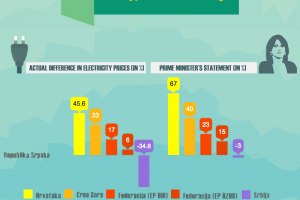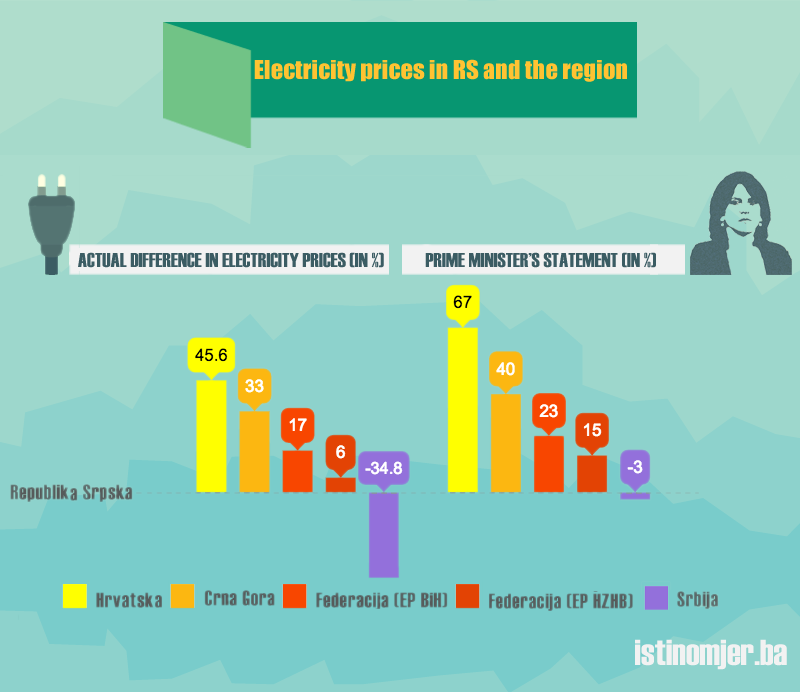 Electricity prices in Republika Srpska have been in the focus of public debate for some time. The government states that the low cost of electricity is one of the most important advantages of RS in relation to the region, and the low cost of electricity, according to the plans of government, should play a key role in attracting investors to RS. However, although the electricity in RS is mostly cheaper than in the region, for an ordinary citizen things are not really that bright when compared to other countries or entities.
Electricity prices in Republika Srpska have been in the focus of public debate for some time. The government states that the low cost of electricity is one of the most important advantages of RS in relation to the region, and the low cost of electricity, according to the plans of government, should play a key role in attracting investors to RS. However, although the electricity in RS is mostly cheaper than in the region, for an ordinary citizen things are not really that bright when compared to other countries or entities.
RS Prime Minister, Željka Cvijanović, when recently talking about electricity prices, stated the following:
“When it comes to the price of electricity for households, the price was also much lower comparing to the region, it was by 67 percent lower than in Croatia, 40 percent lower than in Montenegro, from 15 to 23 percent lower than the FBiH, depending on whether it is a case of Elektroprivreda BiH or Croatian Community Elektroprivreda of Herceg-Bosna. Only in Serbia electricity prices for households are lower by 3 percent, but it is by 4 percent higher for the industry”
Istinomjer compared the prices of electricity for households with two-tariff meters to electricity companies mentioned in the statement and these were the results:
In Republika Srpska, a household which during the winter billing period consumes 100 kWh of electricity in the “cheap” and 100 kWh of energy in “expensive” tariff, will have to pay 37.61 KM, while, if the same amount of energy is consumed in the summer billing period, the bill amounts 29.01 KM. Since the accounting periods are equal (6 months each), it can be estimated that the average amount of the invoice for this amount of electric energy is 33.31 KM. Let's look at the situation in other electricity companies.

For the same amount of electricity, the bill in Elektroprivreda BiH is 35.37 KM, which is only 6, not 15 percent more. The Croatian Community Elektroprivreda of Herceg-Bosna bills a household for 39.13 KM, which is by 17, not 23 percent higher price.
Prime Minister didn’t calculate well the percentages in the other countries in the region either, so in Serbia the bill amounts to 1331.5 dinars (21.71 KM), which is a 34.8 percent lower price than in RS. Electricity prices in Croatia and Montenegro are the highest in the region, but the difference between these countries and the RS are not as great as the Prime Minister thinks. Specifically, in Montenegro the bill for the said energy amount is 22.72 euros (44.44 KM), which means that the power in RS is cheaper by 33%, not by 40% as it was claimed. In Croatia, the household receives the bill in the amount of 189.26 kunas (48.5 KM), which is only 45.6%, not 67% more.
If we consider the ratio of average monthly wages and electricity bills, it will show that the Prime Minister has even less reason for boasting. The average monthly salary in the RS in January 2015 was 812 KM, which means that the electricity bill for 200kWh for one month was 4.1% of average salary. The calculation for the RS, as well as for other country or entity was made for monthly consumption of 200 kWh, but in reality that consumption is usually higher. In the Federation, the average salary in January was 834 KM, which means that this electricity bill amounted to 4.2% of wages (for the Elektroprivreda BH) or 4.6% of the average wage for Elektroprivreda Herceg-Bosna. The average salary for January 2015 in Serbia was 39,285 dinars (645.84 KM), which means that electricity bill in Serbia amounted to only 2.7% of the monthly salary. In Croatia, the average salary for January 2015 was 5656 kunas (1457.51 KM), so the monthly bill for electricity was of 3.3% of average salary, while in Montenegro the average salary in January was 731 euro (1432.26 KM), and that makes the monthly utility bill only 3.1% of the average monthly salary.
So, even though the price of electricity in Republika Srpska are among the lowest in the region, the facts show that the Prime Minister has given incorrect information about how cheaper the electricity actually is. This is especially true if we compare monthly salaries in the region to that in RS, which shows that RS only has a minor advantage in relation to the Federation of Bosnia and Herzegovina (0.1, or 0.5%, depending on the service provider). With all that in consideration, the Prime Minister Cvijanović receives the “untrue” badge for this statement.
(istinomjer.ba)





